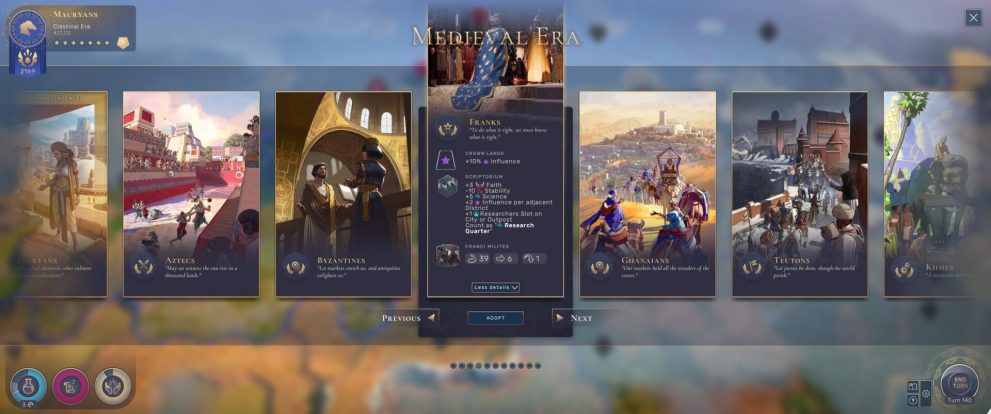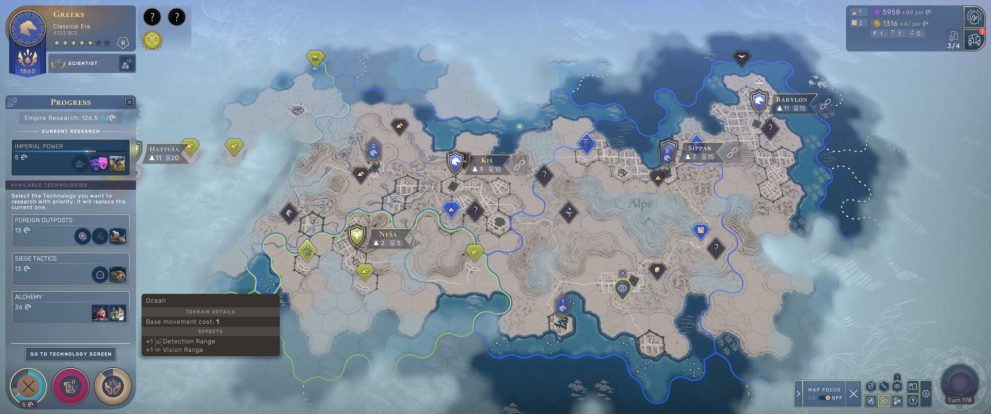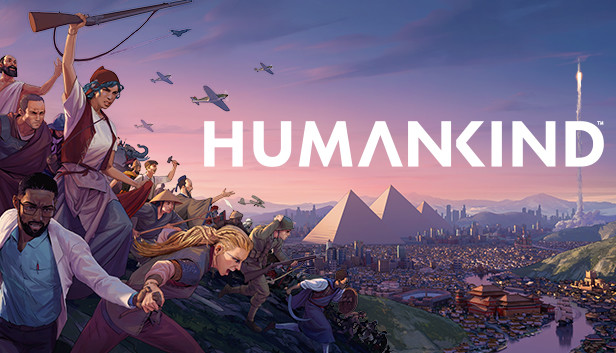Humankind on PC
The 4X grand strategy genre has long since been dominated by Sid Meier’s Civilization series, and for good reason too. The foundation of that series is so strong that it’s hard to talk about any other game in the genre without making some sort of reference to Civ. The two are practically synonymous at this point, which is what makes Humankind such an interesting prospect.
Developed by Amplitude, Humankind is, without a doubt, the biggest competitor to Civilization we’ve seen in recent years. Sporting a clean UI and a few new mechanics that help set it apart from Civ, Humankind does feel like a breath of fresh air and a worthy evolution of the genre… but it’s not without its missteps.
If you’ve played Civ, Humankind should feel immediately famililar. You’re exploring a large map made out of hexagonal tiles, you’re establishing outposts that soon become cities, and you’re building districts and researching various technologies to advance your empire and become the greatest civilization humankind has ever known. Right from the start, though, it’s clear that Humankind is a lot more interested in historical authenticity (not accuracy, mind you) than Civ ever was.
Instead of picking a set civilization to play as for the entire game, you start as a Neolithic tribe that’s just wandering the lands, hunting animals and looking for a place to settle down. It’s only when you’ve found your roots and made enough progress as a tribe that you’re able to enter the Ancient Era, and that’s when you get to pick a culture to follow for that era. And here’s the kicker: you get to pick a new culture each time you enter a new era.

This makes sense in theory because cultures can change and shift along with the times. In Civ, you’re forced to pick a culture at the very start of the game and you’re stuck with it until the game ends, but this can be a disadvantage for a few reasons: first, you haven’t even seen the map yet and you don’t know what resources you’re working with, and second, it’s hard to predict the type of victory that would be most efficient for you in that game.
With Humankind, the ability to switch cultures between each era makes sense. You might choose a more combat-focused culture in the Ancient Era to expand quickly and claim as much territory as you can, then switch to a science or religious-focused culture in the next once the battles are over, and you can focus on your own empire. There are, of course, benefits to sticking to one culture for the duration of the game, and that’s the fame multiplier.
Unlike in Civilization, where there are multiple types of victories, winning a game of Humankind is determined by your fame score by the end of a game. This solves a problem in Civ that could be potentially frustrating: nothing feels worse than some other civ sneaking in a culture victory when you were close to a science or religious victory of your own. In Humankind, regardless of what path you’re embarking on, it always contributes to your fame, which is the only determining factor of who wins and loses.
Humankind also implements a couple of other neat changes, such as relations between empires. Whereas in Civ, you would need to absolutely dominate and take over all of an empire’s territories to force them to surrender, Humankind makes use of a war support meter instead. When you’re at war with someone, if your war support meter goes all the way down, you’ll automatically surrender. The war support meter can deplete when your lands get ransacked and plundered, or if your units are constantly losing in battle.
This makes much more sense, as people would naturally lose faith in their leader’s cause for war if it looked like they were on the losing side. This is a good mechanic, and it also makes things much less tedious or grindy if you were going for total domination.
There are also Technology and Civics trees to explore in Humankind, and these feel a bit more reactive than in Civ, where the trees felt pretty linear for the most part. The game constantly throws narrative events at you, and the way you respond to them can trigger certain Civics popping up a little earlier than they usually would. That being said, after you’ve played a couple of games, you’ve pretty much seen all the narrative events that the game has to offer.

These events felt intriguing and even weighty when I was just getting started, but soon enough, the ‘right’ choice began to feel increasingly obvious. And before I knew it, I was just instinctively clicking on the best choice that would result in the best possible outcome for my empire in seconds, without needing to think too hard on it.
All of these changes sound incredible on paper, but as I began to sink more time into the game, I also started to see its flaws. Being able to change cultures whenever you want is nice, but it also leaves you with nothing distinct to attach to. There are no real culture-specific units to speak of, and every encounter with a different civilization feels cold and empty. The purple player might represent the Aztecs in one era, then go by a completely different name in the next. It becomes hard to keep track of who’s who, and this all leaves Humankind feeling rather clinical.
Indeed, for all of the innovations and bold steps forward that Humankind takes, I couldn’t shake the feeling that everything was just too clean, too sterile, largely devoid of any charm or character. There’s a snarky narrator who chimes in whenever you enact a Civic or become the first to research a technology, and he makes some smarmy comments whenever you hit a certain number of farmers’ quarters, but it never feels quite as grandiose as what we get in Civ.
By and large, though, Humankind is still an exciting evolution for the genre. Its dedication to historical authenticity sets it apart from its largest competitor, and the new systems like war support and shifting cultures feel like the very first steps leading to something that’s potentially greater. It’s not quite the ‘Civ-killer’ it wants to be just yet, but hey, give it a few more iterations and it just might be.
- Clean, beautiful UI.
- The game feels more historically authentic than its competitors.
- Some systems, like war support and fame, make victories feel more fair.
- Being able to switch cultures can make the game feel very impersonal.
- An overall clinical feeling that stems from undercooked systems and a lack of charm and flair.













Updated: Aug 30, 2021 06:51 am